Volume 1-8 (2009-16)
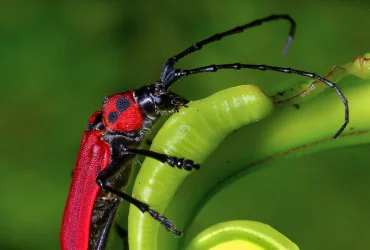 v5i1.88
v5i1.88ISSN: 1800-427X (print)
eISSN: 1800-427X (online)
DOI:10.47605/tapro.v5i1.88
Submitted date: 3 June 2012
Accepted date: 23 May 2013
Published date: 15 June 2013
Pp. 36–43, Pl. 5.
CURRENT STATUS OF Cnemaspis littoralis (JERDON, 1853) (SAURIA: GEKKONIDAE) WITH DESIGNATION OF A NEOTYPE
Vivek Philip Cyriac* & P.K. Umesh
*Corresponding author. E-mail: vivek.geckobia@gmail.com
Abstract
The gecko Cnemaspis littoralis was described by Jerdon in 1853 from a single specimen found in a warehouse on the sea coast of Malabar. A search of the reptile collection of the ZSI failed to uncover any trace of the type specimen of this species; similar searches of the reptile collections of BMNH also proved abortive. Manamendra–Arachchi et al. (2007) also highlighted the need of designating a neotype as the type had been lost. Therefore we ascertain that Jerdon’s type of Cnemaspis littoralis is lost. Hence here we redescribe this species based on specimens collected from the coasts of Kozhikode district of Kerala and designate a neotype for the taxon. Cnemaspis littoralis is distinguished from all other species of Indian Cnemaspis by its overall slender form; few scattered, small, spine like tubercles on flanks; dorsal scales homogeneous; enlarged hexagonal subcaudals and large number of femoral pores (15–18) in males. We also provide observations on the natural history, reproduction and interactions of this species with invertebrates.
Key words : holotype, redescription, taxonomy, distribution, Malabar, ecology, India
Section Editor: John Rudge
eISSN: 1800-427X (online)
DOI:10.47605/tapro.v5i1.88
Submitted date: 3 June 2012
Accepted date: 23 May 2013
Published date: 15 June 2013
Pp. 36–43, Pl. 5.
CURRENT STATUS OF Cnemaspis littoralis (JERDON, 1853) (SAURIA: GEKKONIDAE) WITH DESIGNATION OF A NEOTYPE
Vivek Philip Cyriac* & P.K. Umesh
*Corresponding author. E-mail: vivek.geckobia@gmail.com
Abstract
The gecko Cnemaspis littoralis was described by Jerdon in 1853 from a single specimen found in a warehouse on the sea coast of Malabar. A search of the reptile collection of the ZSI failed to uncover any trace of the type specimen of this species; similar searches of the reptile collections of BMNH also proved abortive. Manamendra–Arachchi et al. (2007) also highlighted the need of designating a neotype as the type had been lost. Therefore we ascertain that Jerdon’s type of Cnemaspis littoralis is lost. Hence here we redescribe this species based on specimens collected from the coasts of Kozhikode district of Kerala and designate a neotype for the taxon. Cnemaspis littoralis is distinguished from all other species of Indian Cnemaspis by its overall slender form; few scattered, small, spine like tubercles on flanks; dorsal scales homogeneous; enlarged hexagonal subcaudals and large number of femoral pores (15–18) in males. We also provide observations on the natural history, reproduction and interactions of this species with invertebrates.
Key words : holotype, redescription, taxonomy, distribution, Malabar, ecology, India
Section Editor: John Rudge
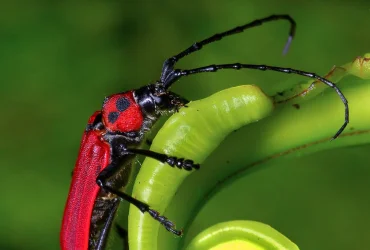 v5i1.87
v5i1.87ISSN: 1800-427X (print)
eISSN: 1800-427X (online)
DOI:10.47605/tapro.v5i1.87
Submitted date: 8 April 2013
Accepted date: 15 April 2013
Published date: 15 June 2013
Pp. 32–35, Pls. 3–4.
DISCOVERY AND DESCRIPTION OF MALE SPECIMEN OF Coluber bholanathi SHARMA, 1976 (REPTILIA: COLUBRIDAE) FROM HYDERABAD, INDIA
Midathala Seetharamaraju & Chelmala Srinivasulu*
*Corresponding author. E-mail: hyd2masawa@gmail.com
Abstract
Here we present the first report of the occurrence of an endemic and little known colubrid, Sharma’s racer Coluber bholanathi Sharma, 1976, from the urban conglomerate of Hyderabad, Andhra Pradesh, India, with a description of the male specimen including details on the hemipeneal structure.
Key words : Indian snakes, range extension, Sharma’s racer, hemipeneal structure
Section Editor: Gernot Vogel
eISSN: 1800-427X (online)
DOI:10.47605/tapro.v5i1.87
Submitted date: 8 April 2013
Accepted date: 15 April 2013
Published date: 15 June 2013
Pp. 32–35, Pls. 3–4.
DISCOVERY AND DESCRIPTION OF MALE SPECIMEN OF Coluber bholanathi SHARMA, 1976 (REPTILIA: COLUBRIDAE) FROM HYDERABAD, INDIA
Midathala Seetharamaraju & Chelmala Srinivasulu*
*Corresponding author. E-mail: hyd2masawa@gmail.com
Abstract
Here we present the first report of the occurrence of an endemic and little known colubrid, Sharma’s racer Coluber bholanathi Sharma, 1976, from the urban conglomerate of Hyderabad, Andhra Pradesh, India, with a description of the male specimen including details on the hemipeneal structure.
Key words : Indian snakes, range extension, Sharma’s racer, hemipeneal structure
Section Editor: Gernot Vogel
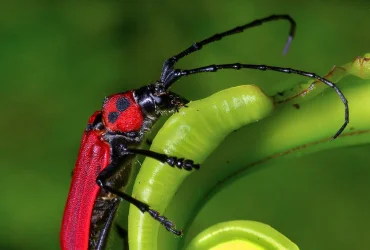 v5i1.86
v5i1.86ISSN: 1800-427X (print)
eISSN: 1800-427X (online)
DOI:10.47605/tapro.v5i1.86
Submitted date: 23 April 2013
Accepted date: 4 May 2013
Published date: 15 June 2013
Pp. 19–31.
REVALIDATION OF Lycodon hypsirhinoides (THEOBALD, 1868) FROM ANDAMAN ISLANDS (SQUAMATA: SERPENTES: COLUBRIDAE)
Gernot Vogel* & S. Harikrishnan
*Corresponding author. E-mail: Gernot.Vogel@t–online.de
Abstract
The Andaman population of the genus Lycodon is compared to Lycodon capucinus Boie, 1827 and Lycodon aulicus (Linnaeus, 1758) occurring on the eastern and western parts of the range of this species complex. The population was found to be distinct and the species name Lycodon hypsirhinoides (Theobald, 1868) is revalidated for this population. It differs from both species in the size, proportions and colouration of adults and juveniles.
Key words : Lycodon aulicus, Lycodon capucinus, Andaman endemics, invasive species, taxonomy
Section Editor: Van Wallach
eISSN: 1800-427X (online)
DOI:10.47605/tapro.v5i1.86
Submitted date: 23 April 2013
Accepted date: 4 May 2013
Published date: 15 June 2013
Pp. 19–31.
REVALIDATION OF Lycodon hypsirhinoides (THEOBALD, 1868) FROM ANDAMAN ISLANDS (SQUAMATA: SERPENTES: COLUBRIDAE)
Gernot Vogel* & S. Harikrishnan
*Corresponding author. E-mail: Gernot.Vogel@t–online.de
Abstract
The Andaman population of the genus Lycodon is compared to Lycodon capucinus Boie, 1827 and Lycodon aulicus (Linnaeus, 1758) occurring on the eastern and western parts of the range of this species complex. The population was found to be distinct and the species name Lycodon hypsirhinoides (Theobald, 1868) is revalidated for this population. It differs from both species in the size, proportions and colouration of adults and juveniles.
Key words : Lycodon aulicus, Lycodon capucinus, Andaman endemics, invasive species, taxonomy
Section Editor: Van Wallach
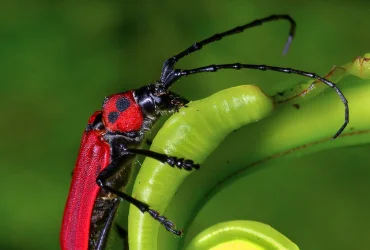 v5i1.85
v5i1.85ISSN: 1800-427X (print)
eISSN: 1800-427X (online)
DOI:10.47605/tapro.v5i1.85
Submitted date: 1 November 2012
Accepted date: 21 April 2013
Published date: 15 June 2013
Pp. 12–18.
GASTROPOD SHELL UTILIZATION PREFERENCES OF HERMIT CRAB Clibanarius zebra (DANA, 1852) (DIOGENIDAE: ANOMURA)
J.N. Trivedi, S. Arya & K. D. Vachhrajan*
*Corresponding author. E-mail: kauresh@gmail.com
Abstract
The aim of the present study was to characterize the patterns of gastropod shell utilization by the hermit crab Clibanarius zebra from four different sites along the Saurashtra coast, Gujarat state, India. A total of 404 individuals of hermit crab were captured (223 males, 147 females and 34 ovigerous females), occupying 22 species of gastropod shells. Maximum species diversity of shells occupied by the crab was observed at Veraval. Amongst all the shell species identified, Cerithium scabridum (36.88 %) was highly occupied by the crab species followed by Astra stellata (11.39 %), Turbo intercostalis (10.64 %), Cerithidia cingulata (9.16 %) and Lunella coronata (7.43 %). Males of C. zebra utilized a wide range of shell species (21 species), while non ovigerous females (13 species) and ovigerous females (7 species) use a specific set of gastropod shell species. The density of live common shell species occupied by C. zebra was also calculated and results revealed that the density of C. scabridum was very high in the intertidal zone compared to other gastropods. This indicates that density of shells may influence the utilization of shells by C. Zebra.
Key words : Saurashtra coast, gastropod shell density, shell occupancy, India
Section Editor: Michelle Wait
eISSN: 1800-427X (online)
DOI:10.47605/tapro.v5i1.85
Submitted date: 1 November 2012
Accepted date: 21 April 2013
Published date: 15 June 2013
Pp. 12–18.
GASTROPOD SHELL UTILIZATION PREFERENCES OF HERMIT CRAB Clibanarius zebra (DANA, 1852) (DIOGENIDAE: ANOMURA)
J.N. Trivedi, S. Arya & K. D. Vachhrajan*
*Corresponding author. E-mail: kauresh@gmail.com
Abstract
The aim of the present study was to characterize the patterns of gastropod shell utilization by the hermit crab Clibanarius zebra from four different sites along the Saurashtra coast, Gujarat state, India. A total of 404 individuals of hermit crab were captured (223 males, 147 females and 34 ovigerous females), occupying 22 species of gastropod shells. Maximum species diversity of shells occupied by the crab was observed at Veraval. Amongst all the shell species identified, Cerithium scabridum (36.88 %) was highly occupied by the crab species followed by Astra stellata (11.39 %), Turbo intercostalis (10.64 %), Cerithidia cingulata (9.16 %) and Lunella coronata (7.43 %). Males of C. zebra utilized a wide range of shell species (21 species), while non ovigerous females (13 species) and ovigerous females (7 species) use a specific set of gastropod shell species. The density of live common shell species occupied by C. zebra was also calculated and results revealed that the density of C. scabridum was very high in the intertidal zone compared to other gastropods. This indicates that density of shells may influence the utilization of shells by C. Zebra.
Key words : Saurashtra coast, gastropod shell density, shell occupancy, India
Section Editor: Michelle Wait
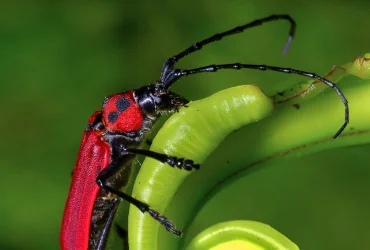 v5i1.84
v5i1.84ISSN: 1800-427X (print)
eISSN: 1800-427X (online)
DOI:10.47605/tapro.v5i1.84
Submitted date: 28 August 2012
Accepted date: 25 January 2013
Published date: 15 June 2013
Pp. 6–11, Pls. 1–2.
FIRST DESCRIPTION OF FEMALE Plesiophrictus millardi POCOCK, 1899 (ARANEAE: THERAPHOSIDAE)
Rajesh V. Sanap* & Zeeshan A. Mirza
*Corresponding author. E-mail: rajeshvsanap@gmail.com
Abstract
The genus Plesiophrictus Pocock (1899) was described when found in Matheran to embody P. millardi. This species was described based on a male specimen, but the female remained unknown for more than a century. Recent surveys conducted in the known range of the species resulted in the discovery of the female, which is herein described for the first time.
Key words : Arachnida, spiders, tarantula, taxonomy, biodiversity, India
Section Editor: Dimitar Dimitrov
eISSN: 1800-427X (online)
DOI:10.47605/tapro.v5i1.84
Submitted date: 28 August 2012
Accepted date: 25 January 2013
Published date: 15 June 2013
Pp. 6–11, Pls. 1–2.
FIRST DESCRIPTION OF FEMALE Plesiophrictus millardi POCOCK, 1899 (ARANEAE: THERAPHOSIDAE)
Rajesh V. Sanap* & Zeeshan A. Mirza
*Corresponding author. E-mail: rajeshvsanap@gmail.com
Abstract
The genus Plesiophrictus Pocock (1899) was described when found in Matheran to embody P. millardi. This species was described based on a male specimen, but the female remained unknown for more than a century. Recent surveys conducted in the known range of the species resulted in the discovery of the female, which is herein described for the first time.
Key words : Arachnida, spiders, tarantula, taxonomy, biodiversity, India
Section Editor: Dimitar Dimitrov
Hubungi Kami
The ultimate aim of the journal is to provide an effective medium for communication of the latest and best scientific information.
Copyright © 2020 Taprobanica. All Rights Reserved
Jasa Pembuatan Website by IKT




